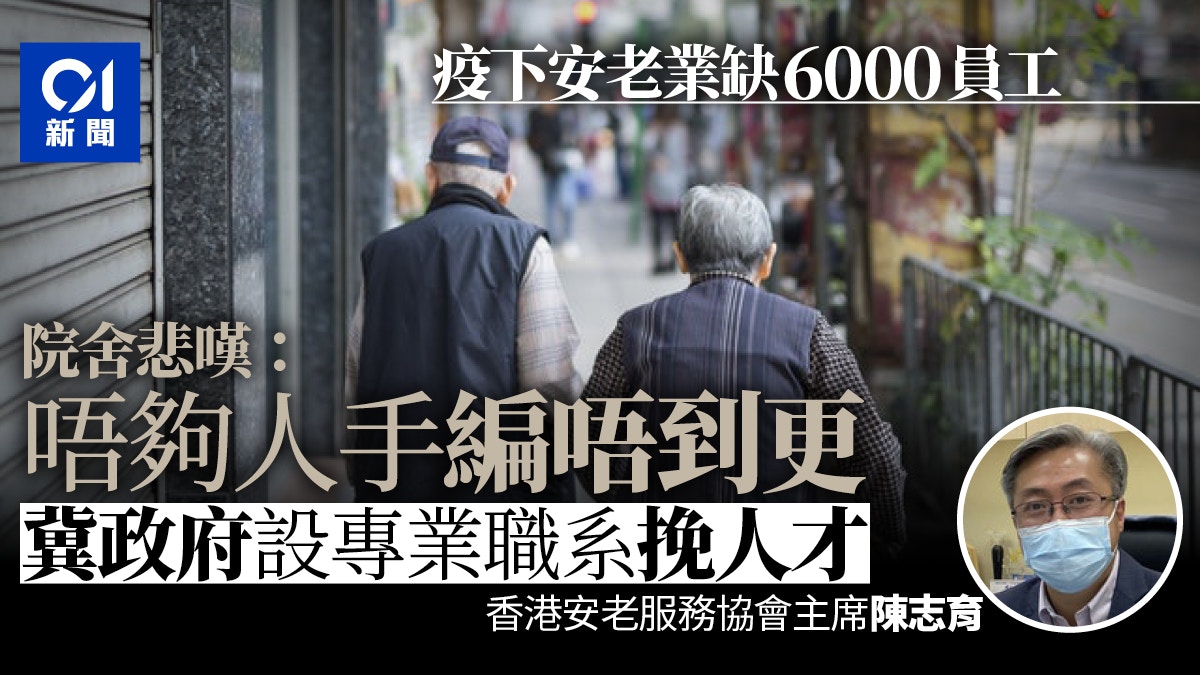According to the "Hong Kong Population Projection 2020-2069", the elderly population will nearly double in the next 20 years. By 2039, 1 out of every 3 Hong Kong residents will be friends.
Faced with an aging population, the problem of insufficient manpower in the elderly care industry in Hong Kong has been difficult to solve for many years. The chairman of the Hong Kong Association for Elderly Services, Chen Zhiyu, said that the turnover rate of residential staff has increased during the epidemic, and many institutions simply cannot meet the SWD standards. It will take weeks. Edited.
Chen Zhiyu is not optimistic about the government's proposed amendment to increase the statutory manpower requirements of residential institutions. He does not have the conditions to do so. Instead, he hopes that the government will face up to the problem of manpower, establish professional grades for elderly care, and retain talents. "The government does not face it, wait for the fire. It’s heart-warming to go to fight the fire first."
[Who runs with me in the second half of the series 2]
Further reading:
Nursing course recruited more than 1,000 people in 5 years, less than 30% entered the industry, a heart-warming sentence became a 27-year-old vital force
The quality of residential care homes for the elderly in Hong Kong is uneven, and the shortage of manpower has persisted for many years.
(Profile picture)
The outbreak of an epidemic that is unknown when it will be cleaned up has aggravated the problem of "ten pots and nine lids" in the elderly care industry.
Chen Zhiyu said that when the epidemic first broke out, some older employees were worried that the infection would affect their families and left. By the third wave of the epidemic in July last year, the elderly homes had an epidemic, and the home care industry had to suspend the employment of substitutes and disperse employees. The manpower is reduced again, but when family members are unable to visit, the workload increases instead, and video visits and handing over of items have to be arranged.
He said that even though the unemployment rate has risen, not many people have switched to the elderly industry. "Although temporarily unemployed, everyone may feel that the elderly are at a higher risk and are vulnerable to infection."
The overall shortage of manpower needs to be changed week by week
He said that both private and subsidized organizations are also facing a shortage of manpower, and the loss is not limited to frontline staff, but also includes professionals such as nurses, physiotherapists, and occupational therapists. "It is not a partial shortage, it is a total shortage. ".
He also quoted a survey conducted by the Association last year, which estimated that there was a shortage of more than 6,000 people in the industry and that the vacancy rate of private residential care homes exceeded 25%. He described the situation as severe and directly affected the quality of services. It will be changed in September, but it cannot be changed according to the family. It must be changed week by week."
Chen Zhiyu, chairman of the Hong Kong Association for Elderly Services, said that the turnover rate of residential staff has increased during the epidemic, and many institutions simply cannot meet the standards of the Social Welfare Department.
(Photo by Huang Yongyu)
Practitioners who lack qualifications and promotion ladders do not see prospects
The government is planning to amend the Regulations on Residential Care Homes for the Elderly, hoping to pass the Legislative Council in the coming year, in order to increase the manpower requirements. For example, each home needs a nurse and manpower needs to be increased during specific periods. Promote, "Depending on the shortage of the family's hands, the government has the conditions, and it can pass new regulations, and it can't be implemented at all."
Since 2015, the government has launched a youth care service sailing plan, hoping to introduce a "new force" to the industry, but The latest data shows that only half of the more than 1,200 students have completed the course.
Chen Zhiyu believes that the current qualification structure is mostly in medical and auxiliary medical professions, not in the elderly industry. "The caregiver will become a health worker, and there will be no health worker." Non-university young people have limited opportunities for promotion. , "The industry is more than hopeful for practitioners, and those who have not yet entered the industry see that this industry has a future and can be professionalized."
Chen Zhiyu emphasized that the government needs to face the problem squarely and put forward forward-looking policies. "If you don't face it, you will put out the fire only when the fire is burning, which is heart-warming." (Photo by Huang Yongyu)
Promote the establishment of professional grades for elderly care
He suggested that the government should establish professional grades for elderly care. For example, new positions for health workers and above may not be as high as nurses. In terms of rehabilitation services and case management, new positions approved by the government can also be added. The problem".
At present, private homes for the elderly and self-financing homes for the elderly can apply for the importation of caregivers through the "Supplementary Labor Scheme." When the Labour Department responded to enquiries, it pointed out that 1511 employees were imported last year and 902 as of June this year.
Chen Zhiyu pointed out that Hong Kong's approval process is longer when the epidemic hits. It is estimated that foreign workers currently account for 6% of the frontline manpower. It is recommended to expand to subsidized hospitals in the future and introduce manpower from outside the mainland, such as Southeast Asia, to alleviate the shortage of manpower.
Demand for elderly services has doubled
"The levy behind the manpower problem is that the government has not addressed the problem squarely. So far, there is no plan to promote it." In the face of an aging population, Chen described the demand for elderly services as "doubling the number", and the number of residential places alone would increase by four to five times. With the increase in the number of immigrants under the epidemic, the elderly may not necessarily travel together. The group that was cared for by family members has become solitary and dependent on the elderly. "The increase in service volume will be unexpected." It emphasizes that the government needs to face the problem squarely and introduce forward-looking policies. "If you don’t go Faced with it, it’s to put out the fire only when the candle is burning, which is heart-warming."
SWD: A new round of questionnaires has been issued to collect the manpower situation and is analyzing in detail
In response to enquiries, the SWD only pointed out that in response to the difficulties of the subsidized welfare service units in hiring and retaining frontline caregivers, the government has allocated additional resources since June 2018 to increase personal care workers, domestic helpers and residential homes. The salary allocation for the recognized position of the waiter, but did not respond to whether there will be a further "professional grade".
Regarding manpower vacancies, the SWD stated that in 2017 and 2019, it used questionnaires to collect information on the manpower situation from organizations that operate subsidized elderly, rehabilitation, and family and child welfare services.
The results showed that the vacancy rates of the relevant positions, including personal care workers and domestic helpers, were 18% and 19% in 2017 and 2019, respectively.
The SWD has issued a new round of questionnaires in the first half of 2021, and is now conducting a detailed analysis of the questionnaires returned by the interviewed units.
New Crown Vaccine|SWD suspends residential homes, Fubitai Outreach Vaccination Service, Industry Worries about Lowering Vaccination Rates Only 5% of residents get injections. The vaccination rate of residential homes is low. Elderly associations are approved. Elderly associations: Some elders have not been evaluated by outreach team every 3 months. Elderly services will be evaluated uniformly. Community services will be updated in July, and homes can only choose 2 from 1 and allow midway. Transfer
01News















